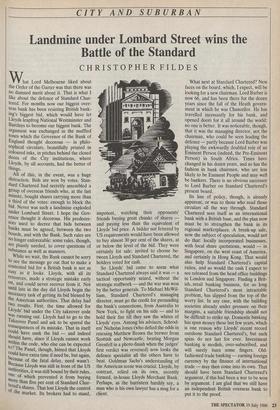CITY AND SUBURBAN
Landmine under Lombard Street wins the Battle of the Standard
CHRISTOPHER FILDES
All of this, in the event, was a huge distraction. Bids are won by votes. Stan- dard Chartered had secretly assembled a group of overseas friends who, at the last minute, bought shares carrying more than a third of the votes: enough to block the bid. Never was such a landmine exploded under Lombard Street. I hope the Gov- ernor thought it decorous. His predeces- sors used to decree that bids between banks must be agreed, between the two boards, and with the Bank. Such rules are no longer enforceable: some rules, though, are plainly needed, to cover questions of substance as well as manners.
While we wait, the Bank cannot be sorry to see the message go out that to make a contested bid for a British bank is not as easy as it looks. Lloyds, with all its resources made a strategic mistake early °n, and could never recover from it. Not until late in the day did Lloyds begin the necessary task of getting its bid blessed by the American authorities. That delay had two results. First, the time allowed for Lloyds' bid under the City takeover code was running out. Lloyds had to go to the Takeover Panel and ask to be spared the consequences of its mistake. That in itself could have sunk the bid — and indeed should have, since if Lloyds cannot work Within the code, who else can be expected to? The Panel, though, hinted that Lloyds could have extra time if need be, but again, because of the fatal delay, need wasn't. Because Lloyds was still in front of the US authorities it was still bound by their rules, one of which prevented it from buying more than five per cent of Standard Char- tered's shares. That lost Lloyds the control of the market. Its brokers had to stand, impotent, watching their opponents' friends buying great chunks of shares and paying less than the equivalent of Lloyds' bid price. A bidder not fettered by US requirements would have been allowed to buy almost 30 per cent of the shares, at or below the level of the bid. They were certainly for sale: invited to choose be- tween Lloyds and Standard Chartered, the holders voted for cash.
So Lloyds' bid came to seem what Standard Chartered always said it was — a tactical opportunity seized, without the strategic staffwork — and the war was won by the better generals. To Michael McWil- liam, Standard Chartered's managing director; must go the credit for persuading the bank's connections, from Australia to New York, to fight on his side — and to hold their fire till they saw the whites of Lloyds' eyes. Among his advisers, Schrod- ers' Nicholas Jones (who defied the odds in rescuing Matthew Brown the brewer from Scottish and Newcastle, beating Morgan Grenfell in a photo-finish when the judges' first verdict was reversed) now looks the defence specialist all the others have to beat. Goldman Sachs's understanding of the American scene was crucial. Lloyds, by contrast, relied on its own, recently formed, in-house Lloyds Merchant Bank. Perhaps, as the barristers harshly say, a man who is his own lawyer has a mug for a client. What next at Standard Chartered? New faces on the board, which, I expect, will be looking for a new chairman. Lord Barber is now 66, and has been there for the dozen years since the fall of the Heath govern- ment in which he was Chancellor. He has travelled incessantly for his bank, and opened doors for it all around the world: no one is better. It was noticeable, though, that it was the managing director, not the chairman, who could be seen leading the defence — partly because Lord Barber was playing the awkwardly doubled role of an Eminent Person (indeed, the Pre-Eminent Person) in South Africa. Times have changed in his dozen years, and so has the fashion in bank chairmen, who are less likely to be Eminent People and may well be bankers. There is no obvious successor to Lord Barber on Standard Chartered's present board.
its line of policy, though, is already apparent, or was to those who read those circulars all the way through. Standard Chartered sees itself as an international bank with a British base, and the plan now must be to strengthen the bank in its regional marketplaces. A break-up sale, now the subject of speculation, would not do that: locally incorporated businesses, with local share quotations, would — in Singapore, on the west coast of America, and certainly in Hong Kong. That would also help Standard Chartered's capital ratios, and so would the cash I expect to see released from the head office buildings in London and Singapore. Finding a Brit- ish, retail banking business, for so long Standard Chartered's most intractable problem, has slipped from the top of the worry list. In any case, with the building societies already under pressure on their margins, a suitable friendship should not be difficult to strike up. Domestic banking has spun money these last few years, which is one reason why Lloyds' recent record outshone Standard Chartered's, but such spins do not last for ever. Investment banking is modish, over-subscribed, and will surely burn some fingers. Old- fashioned trade banking — earning foreign currency by the finance of international trade — may then come into its own. That should have been Standard Chartered's argument, if this had been a war to be won by argument. I am glad that we still have an independent British overseas bank to put it to the proof.


















































 Previous page
Previous page